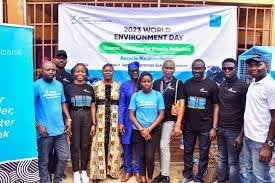Union Bank of Nigeria Plc has joined the global call to protect the environment by partnering with the Nigerian Conservation Foundation (NCF) to host a special event marking World Environment Day 2025. The event, which took place at the Lekki Conservation Centre in Lagos, focused on the theme “Ending Plastic Pollution” and brought together environmental advocates, corporate leaders, and stakeholders committed to addressing the growing crisis of plastic waste in Nigeria.
The symposium aimed to raise awareness and push for innovative solutions that could help reduce the harmful effects of plastic pollution on the country’s ecosystems and urban centres. Union Bank, one of Nigeria’s oldest and most respected financial institutions, used the platform to underline its commitment to sustainability and environmental stewardship.
Speaking at the event, the bank’s Chief Brand and Marketing Officer, Olufunmilola Aluko, said Union Bank was determined to play an active role in tackling environmental challenges. “At Union Bank, sustainability goes beyond banking. We are dedicated to empowering communities with knowledge and resources, like recycling initiatives, to tackle plastic pollution and rejuvenate our environment,” she said.
The bank also extended its environmental campaign to schools in Lagos, where it carried out educational outreach programmes aimed at young Nigerians. During these sessions, Union Bank donated recycling bins to several secondary schools and organised talks on the importance of protecting the environment, proper waste disposal, and the role young people can play in making their communities cleaner and safer.
The educational initiative, which targets teenagers and students in public and private schools, is part of the bank’s UnionCares platform—a corporate social responsibility programme focused on improving the quality of life in communities across the country.
The bank explained that through UnionCares, it has launched and supported several campaigns that promote ethical business conduct, social impact, and sustainable development goals. By adding environmental education and plastic recycling to its focus areas, the bank said it hopes to encourage long-term behaviour change, especially among the youth.
The Nigerian Conservation Foundation, which hosted the symposium at its renowned Lekki Conservation Centre, praised Union Bank for its leadership in promoting sustainability within the financial sector. The foundation stressed the importance of public-private partnerships in the fight against climate change, plastic pollution, and biodiversity loss.
Participants at the event included environmental scientists, climate advocates, and senior executives from several Nigerian companies. They discussed issues such as marine pollution, the dangers of microplastics, waste management policies, and how innovation and technology can be used to reduce plastic usage in daily life.
According to environmental experts, Nigeria produces about 2.5 million tonnes of plastic waste annually, much of which ends up in rivers, drainage systems, and landfills. Lagos alone is estimated to generate about 800,000 tonnes of plastic waste every year. Stakeholders at the symposium agreed that while individual action is important, there is a need for stronger government policy and enforcement around plastic use and disposal.
Union Bank said it would continue to support environmental protection efforts across the country and pledged to expand its recycling and awareness programmes to more states in the coming months. It also urged other financial institutions and corporate bodies to prioritise sustainability and take measurable action to protect the environment.
World Environment Day, observed annually on June 5th, is the United Nations’ main platform for raising awareness and encouraging global action for the environment. This year’s theme, “Ending Plastic Pollution,” is part of a multi-year campaign to eliminate single-use plastics and promote a circular economy that keeps waste out of nature.
Union Bank’s recent engagement reinforces the growing role of financial institutions in advancing the United Nations Sustainable Development Goals (SDGs), particularly Goal 12 on responsible consumption and production and Goal 13 on climate action. By integrating sustainability into its operations and community engagement, the bank said it is helping to build a greener and more inclusive economy.
